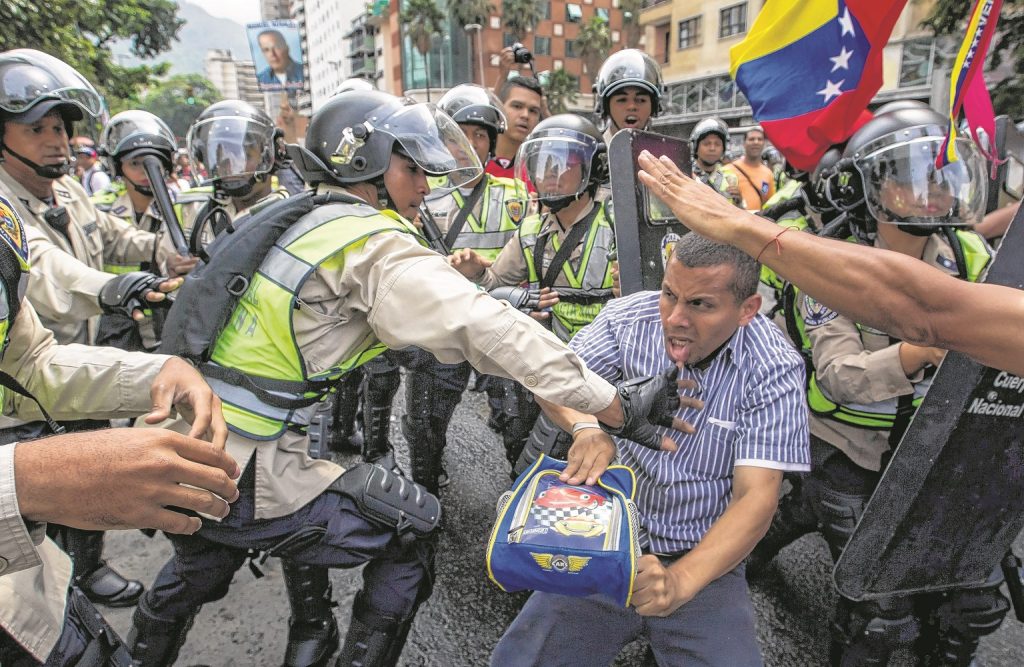
Editor’s note: The names of the three expatriates have been changed due to security concerns for relatives still living in their Venezuelan homeland.
By Joyce Coronel
As the crisis in Venezuela continues to escalate, three people who fled their economically crumbling nation and have taken refuge in Tempe and West Chandler have expressed their fears over rapidly deteriorating and increasingly dangerous conditions.
Javier Cortez and Marina Gomez, siblings, with their friend Teresa Rodriguez, left Venezuela before political and social catastrophe struck, but remain in frequent contact with their loved ones who still live there, many of them in Judibana, the small town where the three immigrants grew up.
“Judibana used to be a paradise,” Gomez said. “Now it’s a disaster.”
Basic necessities like food, medicine, water and electricity are scarce or non-existent, all three former Venezuelans said.
The oil-rich nation—a founding member of OPEC—has descended into chaos with 750 percent inflation, food riots and the second-highest murder rate in the world.
Cortez, who last visited his birthplace two years ago, was stunned by the country’s pervasive violence.
“By the time it starts getting to be dusk, you need to be home because you don’t know if somebody’s going to kill you,” Gomez said. “People are getting assaulted for their phones or their shoes. They don’t wear wedding rings or jewelry or nice clothes in public.”
Even in their cars, the specter of violence doesn’t diminish, he said.
“In your car, you keep the windows up, because the minute you stop at an intersection, they point a gun to your head,” Gomez said.
Rodriguez said she sends over-the-counter medications such as allergy pills to her relatives.
“Medications that are so common here for things like high blood pressure are just non-existent there. Antibiotics, anything—you can’t find them,” Rodriguez said.
Her sister’s physician writes new prescriptions, switching medications, but “they can’t find anything. Everything is just gone.”
Cortez and Gomez say their youngest sister, a diabetic, was recently hospitalized. “If you get sick, you are in pretty bad shape,” Cortez said. “You go to the hospital and have to bring your own sheets, pillows, cleaning supplies—even hypodermic needles—because you can’t find them there.”
“Our other brothers and sisters had to bring her food, because all they had at the hospital every day was a little spaghetti,” Gomez said.
“People are dying.”
Unable also to obtain even the basics for personal hygiene, there’s a growing sense of despair among people who once lived upper-middle-class lives.
“My sister’s friend doesn’t have water to take a shower so she stopped going to work. People are very demoralized,” Rodriguez said. “There’s no deodorant, no shampoo, no toothpaste.”
You might find an item one day, but two days later the price is four or five times higher, she added. Hyperinflation means people must carry backpacks or large bags filled with cash, even for minor purchases, all the while hoping they aren’t robbed.
On those rare occasions when one can find something basic like detergent, there’s often no electricity. And even if you manage to have both detergent and electricity, Rodriguez said, often there is no water. Something as simple as doing the laundry has become literally impossible.
Venezuelans spend most of their time standing in line, waiting to buy whatever might be available.
“It’s like two or three days in line. Then you get in and there’s not anything left,” Rodriguez said.
“And they get mugged by people in the line—it’s very dangerous.”
Perhaps most heartrending of all, Rodriguez spoke of a relative who had only two cans of formula for her baby but learned of another family whose baby had nothing at all.
“She decided to give this family a can of formula because she felt terrible—the baby is dying,” Rodriguez said.
“A few days later, the grandfather of the baby came home with a carton of 48 eggs because he said, ‘We have to save our baby. Eggs are like gold there.’”
Cortez said that if he were still living in Venezuela, he’d most likely be languishing prison.
“I would be one of those arrested for fighting the government, fighting the injustice,” he said, eyes flashing.
The New York Times recently reported that there are about 100 political prisoners and some 2,000 people who are the focus of politically driven prosecution in Venezuela. Cortez’ adopted sister, who once worked for the opposition party during the Hugo Chavez regime, was granted asylum in the U.S. several ago. Chavez, who died in 2013 after 15 years in power, was replaced by Nicolas Maduro, who is also a socialist.
Cortez said he blames Venezuela’s socialist government for ruining the country and shutting down opposition. A referendum to recall the president garnered more than a million signatures, but the Maduro regime claims thousands of them were fraudulent. Meanwhile, state workers who signed the referendum have been fired from their jobs.
Rodriguez said she contacted her family just days ago and was told the regime is not allowing people to leave the country.
“If Americans want to do something, they need to write their congressman and their senators so they can put the pressure on because it is an injustice, what’s happening in Venezuela,” Cortez said.
A U.S. citizen who traveled to Venezuela last month was arrested and is being held in custody on what some say are trumped-up charges of terrorism and espionage.
The U.S. State Department has issued a travel advisory for the country, warning of violent crime, unrest and government crackdown.
Said the advisory, in part:
“The U.S. Embassy makes it a priority to request access to U.S. citizens, but U.S. citizens cannot assume a consular officer will visit them within 24-72 hours of arrest.”


